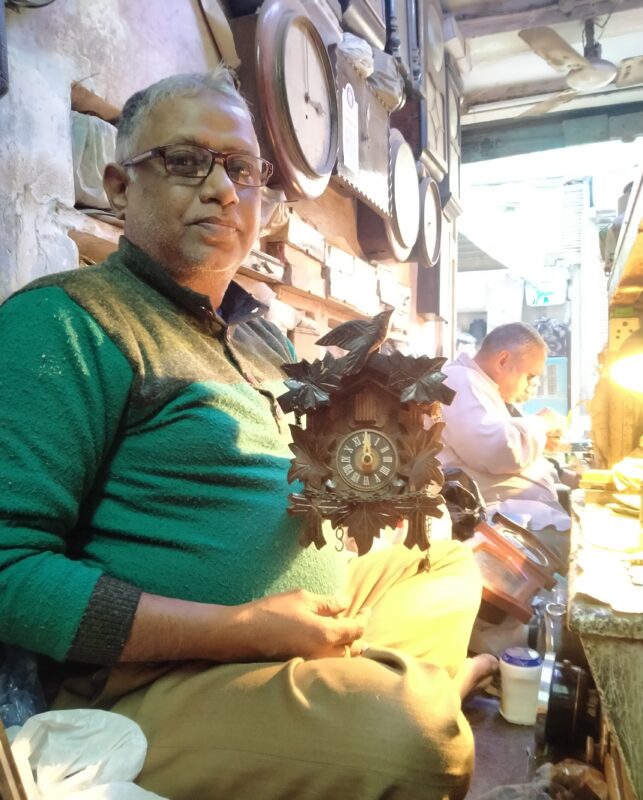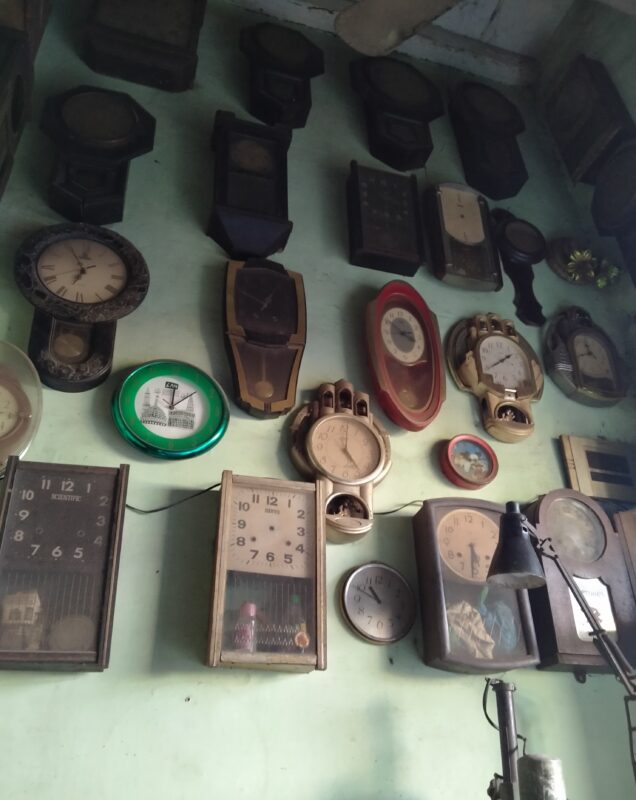Shokat Khan, 50, who owns tiny clock repair shop in the Churiwalan mohalla of Delhi-6, recalls a recent incident that represents the dilemma faced by those who keep old mechanical clocks functional for connoisseurs but aren’t paid enough for their services.
“A few months ago, I was invited by a family in Rohtak, Haryana to repair a tower clock. The clock was set up by their ancestors in the village. After I had repaired it, they told me that they can’t pay the amount that I was charging. They also said that they wanted the tower clock to be repaired because there are memories attached to it. Otherwise, they don’t need it,” recalls Shokat as he sits on his counter opposite the area’s popular shops of kebabs and chicken.
Shokat, who runs Shokat Watch shop, repairs mechanical clocks in his shop while his son handles the modern quartz clocks and watches, which have rendered the former useless.
Also read: Fashion, food a grist for Dhan Mill
He is one of the few who are keeping the mechanical clocks ticking in this day and age, largely for those who are fond of collecting antique items.
A few metres away from his little establishment, in the same Churiwalan mohalla (locality), is Mohammad Ayaz Khan, a 56-year-old clock repairer, who owns a tiny shop ‘Khan Watch Brothers’ where he deals in the repair of a wide array of clocks.

The shabby walls are a testimony to the changing times. While it is mostly silent, one can hear the chimes on the hour. “There aren’t too many who have survived in this age of quartz clock. I have been repairing clocks for more than thirty years now and by the grace of God, I am getting enough work,” said Khan.
As Khan was sipping chai, a middle-aged man entered his shop with a tote bag. He took out a cuckoo clock from it and handed it over to Khan. After about fifteen minutes of close examination with his equipment, which included forceps, screwdrivers, pliers, tweezers among others, he nodded his head and the customer left the shop. The man was his permanent client who hails from Shamli in Uttar Pradesh. Whenever he visits old Delhi for business, he brings this cuckoo clock for check-up and repair.
Khan seems to have a bit more business than Shokat.
Among his visitors are lawyers, politicians, industrialists and many others who still value the things of yore and are willing to pay him his charges which vary between Rs 800 and Rs 10,000 depending on the work. Khan has two brothers who sit right next to him in the shop. While he repairs mechanical wall clocks, his two brothers look after wrist watches and the modern-day quartz clock. The shop was set up by their father in 1972.
“Only yesterday, a customer came to my shop from Gurugram with a Japanese clock which has now completely vanished from the market,” he explained.
But there are clocks which are beyond repair. Those clocks then hang on the walls where dust drapes the chimes. Khan’s shop features several clock brands of the old times, including Seth Thomas, Smith Enfield, Seikosha and Ansonia. These clocks can’t be repaired and no one is interested in them now so they hang on the walls of his shop as decoration.
Suhail Akhtar, whose repair shop Suhail Watch Company is located just opposite Jama Masjid, explains why certain clocks can’t be repaired.

“The Britishers always noted down the formula of whatever they invented, and while they have copyright, the formula helps the people who are keen on producing [or repairing] the objects. But that’s not the case with Indians. We will die with our craftsmanship skills but will rarely disclose the process. This is one of the reasons why these clocks (and he pointed out a dozen of them hanging on the walls of his workshop) are hanging useless,” he said.
The 63-year-old Akhtar is a living encyclopaedia on mechanical clocks and watches. But he knows that merely having knowledge about age-old clocks doesn’t bring in any money. Only repair work pays and that is few and far between.
“Mechanical clocks are complex as compared to quartz. There’s an amalgamation of metal, springs, glass and stone, that kept everyone on time for years, and continue to interest the horologists and collectors,” he explained.
Akhtar has no work these days and it’s a reality that he is trying hard to make peace with. A customary glance at the walls of his tiny workshop reminds the hard times that the shop has witnessed.
“Yes, there’s no work these days. My eyes have become old and I can’t work. I open the shop in the morning, at around 10 and shut it in afternoon at 1:30 pm sharp. Then I return in the evening. I have seen the best phase in clockmaking, from the times when there was sundial and tower clock, to now when my kids have got me this smartphone,” he said.
Akhtar, who learnt repairing clocks on his own as a youngster by opening and studying the mechanics of the clocks and watches his father and other relatives gifted him, now makes ends meet by doubling up as a hakim – a practitioner of herbal medicine — in the same shop.
Shokat provides an explanation on why most people aren’t interested in getting the old clocks repaired and prefer disposing them off.
“When people can buy a new watch for the money that we charge for repairing, why would they come? People have moved on and they don’t want to invest their precious time and money on old clocks. There’s no work [in this] but this is what I know, so I have no choice.”
He welcomes a few customers in the day. They are mostly traders who regularly visit the market and wish to get their clocks/watches repaired at a cheap price.
“Everyone has a smartphone [which can tell time] in their pockets nowadays and those who have mechanical clocks at home or offices do not care about its repair and simply throw them out. However, there are a handful of people who like antique things adorning the chic walls of their houses. Those are our customers.”
But, as his travails in Rohtak showed, there are many unwilling to pay him the due for his labour.
Follow us on:
Instagram: instagram.com/thepatriot_in/
Twitter: twitter.com/Patriot_Delhi
Facebook: facebook.com/Thepatriotnewsindia





